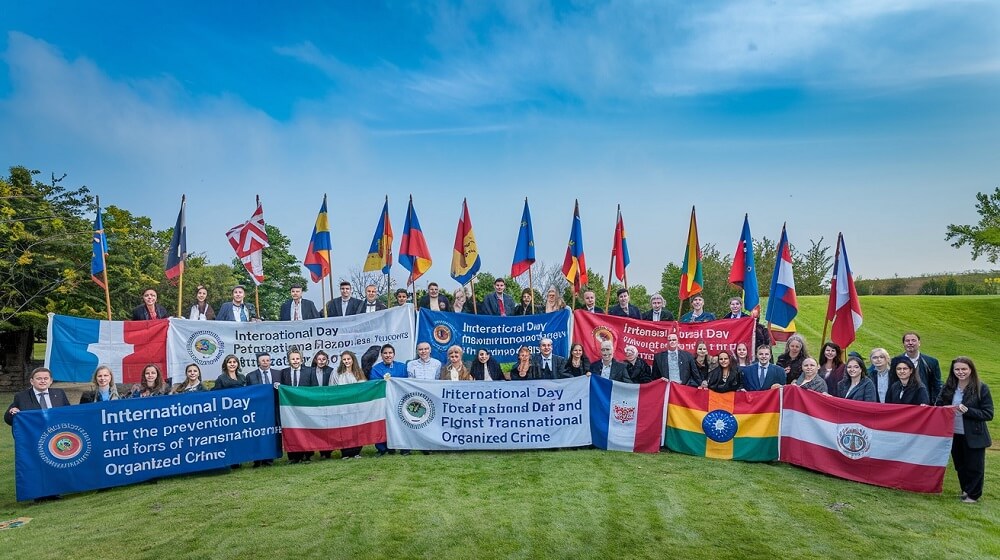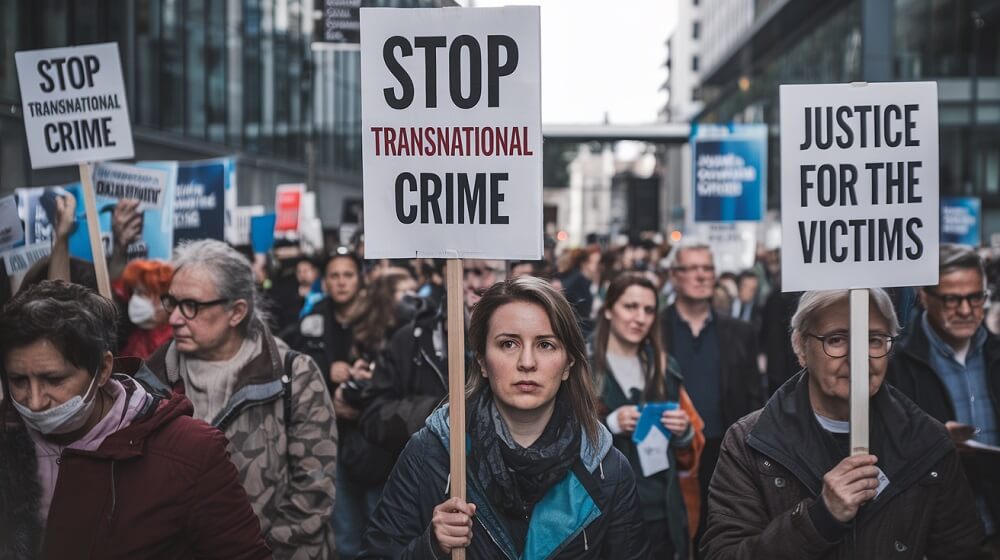
International Day for the Prevention of and Fight against All Forms of Transnational Organized Crime - UN Initiatives
Every year, people worldwide face the consequences of transnational organized crime. From human trafficking and cybercrime to environmental destruction and drug smuggling, these criminal activities have a far-reaching impact on our daily lives. They damage economies, exploit the vulnerable, and undermine justice.
On November 15, 2024, the International Day for the Prevention of and Fight against All Forms of Transnational Organized Crime was created for this purpose. This observance serves as a global call to action, uniting individuals, organizations, and governments in the fight against organized crime.
This article delves into the significance of this day, the challenges we face in combating organized crime, and actionable steps that anyone can take to contribute to a safer, more just society. Let’s explore how we can all play a role in addressing this global issue.

What Is Transnational Organized Crime?
Transnational organized crime refers to criminal activities conducted by highly organized networks that transcend national borders. These crimes are not confined to a specific country or region; instead, they exploit the differences in laws, regulations, and enforcement across nations to operate undetected. The primary motivation behind transnational organized crime is profit, often achieved through illegal and unethical means such as trafficking, smuggling, or fraud.
These activities take many forms, including human trafficking, drug smuggling, cybercrime, arms trafficking, and even environmental crimes like illegal logging and wildlife trafficking. For example, human trafficking involves the illegal movement and exploitation of individuals, often under false promises of employment or safety, resulting in forced labor or other exploitative conditions. Similarly, cybercrime targets individuals, corporations, and governments, causing significant financial and reputational harm.
The global impact of transnational organized crime is vast and deeply damaging. It destabilizes economies by fueling corruption, tax evasion, and counterfeit markets, undermines security by funding terrorism and armed conflicts, and devastates communities by exploiting vulnerable populations. The interconnected nature of today’s world allows these networks to grow rapidly, making it increasingly difficult for law enforcement agencies to track and dismantle them.
Addressing transnational organized crime requires coordinated international efforts, public awareness, and legal frameworks that hold offenders accountable while protecting victims. It is a global issue that demands unified action.
Common Forms of Transnational Organized Crime
-
Human Trafficking
-
Over 25 million people globally are victims of forced labor or exploitation, often trafficked across borders.
-
Victims are promised opportunities for work or education but are subjected to horrific conditions.
-
-
Drug Trafficking
-
The global drug trade generates billions of dollars annually.
-
Illicit drugs devastate lives, fuel violence, and destabilize communities.
-
-
Cybercrime
-
Cybercriminals use sophisticated techniques to commit identity theft, ransomware attacks, and fraud.
-
Businesses and individuals lose billions each year to online scams.
-
-
Environmental Crime
-
Illegal logging, mining, and wildlife trafficking cause ecological destruction and deprive communities of vital resources.
-
These forms of crime may seem disconnected from your daily life, but they affect global stability, security, and justice in ways that ripple into every corner of society.
The Importance of the International Day
The International Day for the Prevention of and Fight against All Forms of Transnational Organized Crime highlights the need for collective action. Established by the United Nations, this day draws attention to the efforts required to combat organized crime, which thrives on disunity and lack of awareness.
The Purpose of the Day
-
To educate people about the realities of organized crime.
-
To encourage cooperation between countries, organizations, and communities.
-
To inspire individuals to take action in their daily lives.
The observance is grounded in the Palermo Convention, the United Nations Convention against Transnational Organized Crime (UNTOC). This legal framework, adopted in 2000, helps countries collaborate on dismantling organized crime networks.
The Role of the United Nations
The United Nations plays a pivotal role in fighting transnational organized crime. Through its United Nations Office on Drugs and Crime (UNODC), it provides the tools, expertise, and resources needed to address this complex issue.
Key UN Initiatives
-
Palermo Convention
-
Provides legal frameworks for prosecuting transnational crimes.
-
Includes protocols on human trafficking, smuggling of migrants, and arms trafficking.
-
-
Global Cooperation
-
The UN works with organizations like Interpol and Europol to share intelligence and resources.
-
Joint operations have dismantled major criminal networks and rescued victims.
-
-
Capacity Building
-
UNODC offers training and technical assistance to law enforcement agencies worldwide.
-
This includes educating officers on identifying and addressing human trafficking or cybercrime.
-
These initiatives emphasize the importance of a united, international response to organized crime. No country can fight this battle alone.
Challenges in Combating Organized Crime
Despite significant progress, combating transnational organized crime remains challenging. Criminal networks are adaptive and resourceful, constantly evolving their methods to exploit weaknesses.
Key Challenges
-
Cross-Border Complexity
-
Criminals operate across multiple jurisdictions, making enforcing laws or prosecuting offenders difficult.
-
Example: A drug cartel may produce narcotics in one country, transport them through another, and sell them in a third.
-
-
Technological Advancements
-
The rise of cryptocurrency and the dark web has given criminals new tools to evade detection.
-
Tracking illicit online transactions often requires cutting-edge technology and expertise.
-
-
Lack of Resources
-
Many nations need more financial or technical resources to combat organized crime effectively.
-
This creates a disparity in enforcement and allows criminals to exploit vulnerable regions.
-
These challenges require innovative solutions and greater collaboration between governments, organizations, and individuals.
Real-Life Impacts of Organized Crime
Organized crime isn’t just an abstract problem—it affects real people and communities daily.
Case Studies
-
Human Trafficking Victims
-
A survivor from Southeast Asia shared her story of being trafficked under the guise of employment opportunities. After years of forced labor, she was rescued by an international task force.
-
-
Environmental Destruction in the Amazon
-
Illegal logging operations, often run by organized crime groups, are responsible for significant deforestation. This damages ecosystems and displaces Indigenous communities.
-
Economic Consequences
-
Governments lose billions in revenue from counterfeit goods and smuggling.
-
Local businesses suffer due to unfair competition from counterfeit products flooding the market.
How You Can Contribute
You don’t have to be a policymaker or law enforcement officer to make a difference. Small actions can create meaningful change.
Raise Awareness
-
Share information about organized crime with your community.
-
Participate in local or online campaigns.
Support Organizations
-
Donate to NGOs like the Polaris Project or UNODC initiatives.
-
Volunteer for awareness programs or victim support efforts.
Report Suspicious Activity
-
If you see something unusual, report it to local authorities.
-
Your vigilance can prevent crimes and save lives.
By taking these steps, you can help create a safer world.
Inspiring Success Stories
Efforts to combat organized crime have already made a difference:
-
In 2022, an international operation led to the arrest of over 200 members of a drug cartel, dismantling their network and seizing billions in assets.
-
Anti-trafficking programs have rescued thousands of victims and provided them with resources to rebuild their lives.
These stories remind us that progress is possible when we work together.
Conclusion
Transnational organized crime is a global issue that demands collective action. The International Day for the Prevention of and Fight against All Forms of Transnational Organized Crime reminds us that each of us has a role.
Your efforts matter, whether through raising awareness, supporting organizations, or simply staying informed. Together, we can disrupt criminal networks and build a safer, more just world.
Let’s commit to action—not just on this day, but every day. After all, the fight against organized crime is a fight for humanity itself.
FAQs
What is transnational organized crime?
It refers to criminal activities conducted by networks across national borders, including human trafficking, drug smuggling, and cybercrime.
Why is this International Day important?
It raises awareness and fosters global cooperation to combat organized crime effectively.
How does organized crime impact individuals?
It affects communities through violence, exploitation, and economic losses.
What role does the UN play in combating organized crime?
The UN provides frameworks, training, and partnerships to help nations address these crimes collaboratively.
How can I contribute to the fight against organized crime?
Raise awareness, support anti-crime initiatives, and report suspicious activities in your community.
International Days and Weeks




